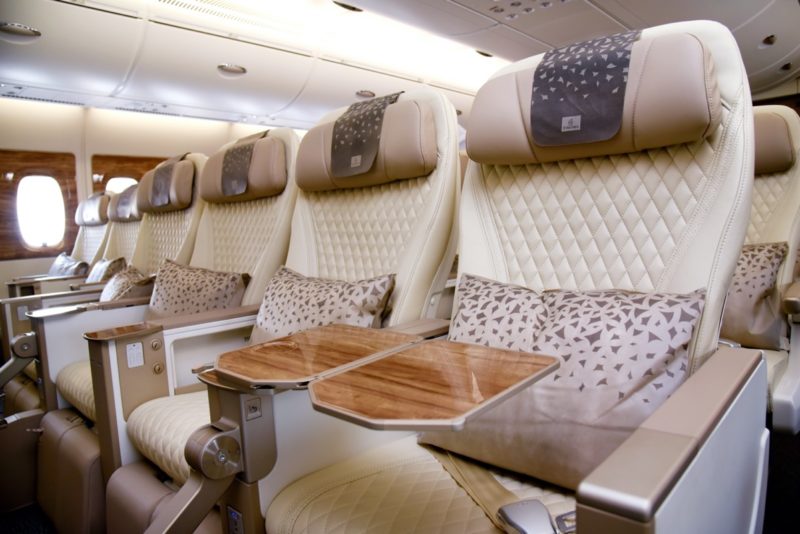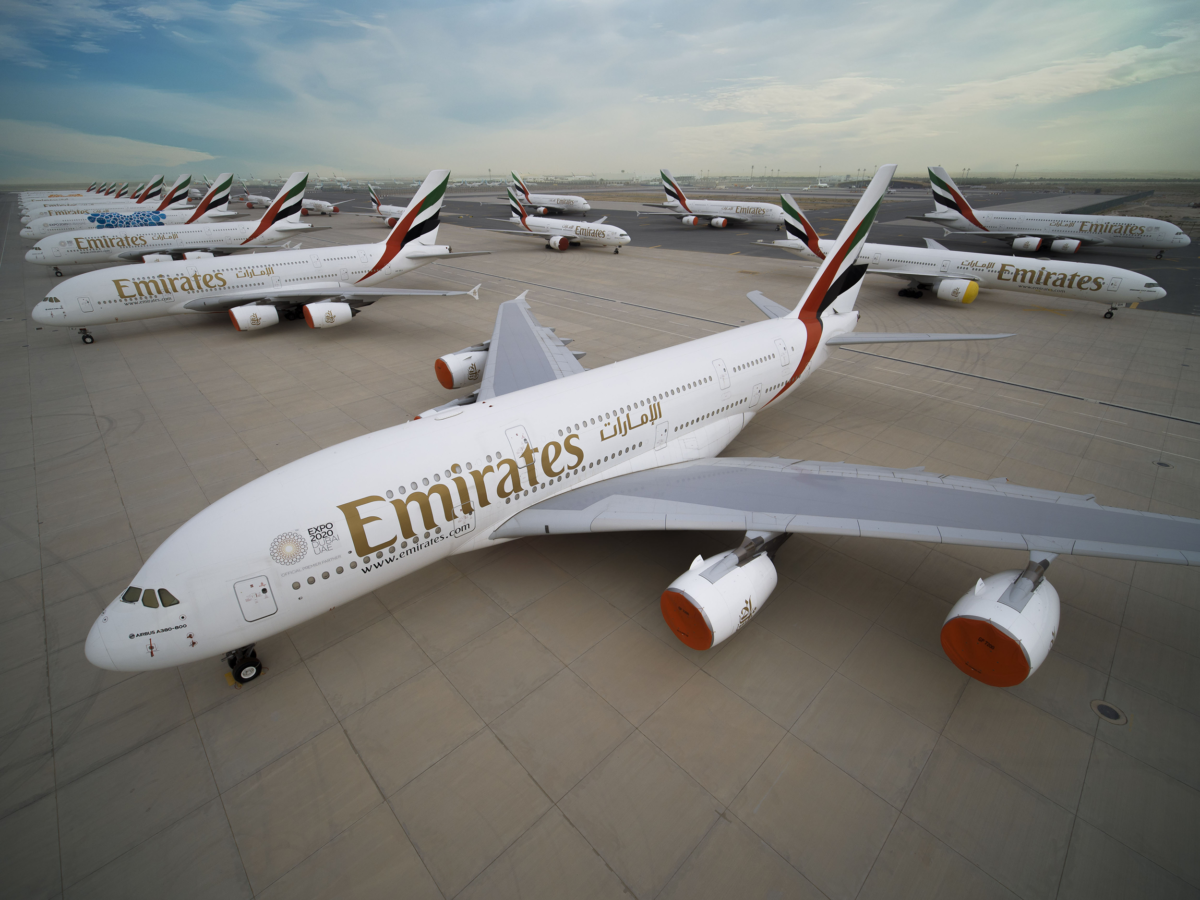The Emirates Group today announced a yearly loss for the first time in over 30 years, caused by a significant drop in revenue, fully attributed to the impact of COVID-19 related flight and travel restrictions throughout its entire financial year 2020-21. The group has recorded an annual loss of AED 22.1 billion ($6.0 billion) due to the COVID-19 pandemic impact, their first non-profitable year in over three decades.
- The groups revenue of AED 35.6 billion ($9.7 billion) was impacted by worldwide travel restrictions and border closures during the entire financial year
- Results were impacted by a one-time impairment charges of AED 1.5 billion on the group’s non-financial assets
- Year ended with a solid cash balance of AED 19.8 billion ($5.4 billion)
Emirates has reported a loss of AED 20.3 billion ($5.5 billion) down from AED 1.1 billion ($288 million) profit in the previous year.
- Revenue declined by 66% to AED 30.9 billion ($8.4 billion), due to the temporary suspension of passenger flights at their hub in March 2020 and ongoing global travel restrictions
- Airline capacity reduced to 24.8 billion ATKMs, with aircraft fleet size reduced by 11 aircraft
dnata has reported a loss of AED 1.8 billion ($496 million) down from AED 618 million ($168 million) profit in the previous year.
- Revenue declined by 62% to AED 5.5 billion ($1.5 billion) reflecting the pandemic impact across all business divisions in the UAE and worldwide
- Expanding global footprint, with the full acquisition of Destination Asia and the opening of new catering and retail facilities
FY 2020-21 Result in Detail
Released today in their 2020-21 Annual Report, the Emirates Group posted a loss of AED 22.1 billion ($6.0 billion) for the financial year ended 31st March 2021 compared with an AED 1.7 billion ($456 million) profit for last year. The Group’s revenue was AED 35.6 billion ($9.7 billion) a decline of 66% over last year’s results. The Group’s cash balance was AED 19.8 billion ($5.4 billion) down 23% from last year mainly due to weak demand caused by the various pandemic related business and travel restrictions, across all of the Group’s core business divisions and markets.
"The COVID-19 pandemic continues to take a tremendous toll on human lives, communities, economies and on the aviation and travel industry. In 2020-21, Emirates and dnata were hit hard by the drop in demand for international air travel, as countries closed their borders and imposed stringent travel restrictions."
His Highness Sheikh Ahmed bin Saeed Al Maktoum, Chairman and Chief Executive, Emirates Airline and Group
"Our top priorities throughout the year were: the health and wellbeing of our people and customers, preserving cash, controlling costs and restoring our operations safely and sustainably. Emirates received a capital injection of AED 11.3 billion ($3.1 billion) from our ultimate shareholder, the Government of Dubai, and dnata tapped on various industry support programmes and availed a total relief of nearly AED 800 million in 2020-21. These helped us sustain operations and retain the vast majority of our talent pool. Unfortunately, we still had to make the difficult decision to resize our workforce in line with reduced operational requirements."
For the first time in the Group’s history, redundancies were implemented across all parts of the business. As a result, the Group’s total workforce has been reduced by 31% to 75,145 employees, representing over 160 different nationalities.
Keeping a tight control on costs, across the Group, financial obligations were restructured, contracts renegotiated, processes examined and operations consolidated. The various cost reduction initiatives returned an estimated saving of AED 7.7 billion during the year.
In 2020-21, the Group collectively invested AED 4.7 billion ($1.3 billion) in: new aircraft and facilities, the acquisition of companies and the latest technologies to position the business for recovery and future growth. They have also continued to invest resources towards environmental initiatives, as well as supporting communities and incubator programmes that nurture talent and innovation to drive future industry growth.
Sheikh Ahmed said "No one knows when the pandemic will be over, but we know recovery will be patchy. Economies and companies that entered pandemic times in a strong position, will be better placed to bounce back. Until 2020-21 Emirates and dnata have had a track record of growth and profitability, based on solid business models, steady investments in capability and infrastructure, a strong drive for innovation and a deep talent pool led by a stable leadership team. These fundamental ingredients of our success remain unchanged. Together with Dubai’s undiminished ambitions to grow economic activity and build a city for the future, I am confident that Emirates and dnata will recover and be stronger than before."
Emirates Airline Performance
Emirates’ total passenger and cargo capacity declined by 58% to 24.8 billion ATKMs at the end of 2020-21. This was due to pandemic related flight and travel restrictions, including a complete suspension of commercial passenger services for nearly eight weeks as directed by the UAE government from 25th March 2020.
Emirates received three new A380 aircraft during the financial year and phased out 14 older aircraft; comprising of 9 Boeing 777-300ERs and 5 A380s, leaving their total fleet count at 259 at the end of March. Emirates’ average fleet age remains at a youthful 7.3 years.

Emirates’ order book for 200 aircraft remains unchanged at this time. The airline is firmly committed to their long-standing strategy of operating a modern and efficient fleet, which underscores their "Fly Better" brand promise, as young aircraft are better for the environment, better for operations and better for customers.
Working closely with aviation stakeholders, to design and implement bio-safety measures, Emirates has gradually restored their passenger network and hub connectivity from mid-June 2020, as the UAE re-opened for transit travellers and later for international arrivals.
From zero scheduled passenger flights at the start of the financial year, to operations in over 120 destinations by 31st March 2021, Emirates has shown their ability to adapt and respond to challenges and the resilience of their people and business model.
With significantly reduced and constrained capacity deployment across most markets, Emirates’ total revenue for the financial year has declined by 66% to AED 30.9 billion ($8.4 billion). Currency fluctuations this year had no significant impact on airline revenue.
Total operating costs decreased by 46% from last financial year. Cost of ownership (depreciation and amortisation) and employee costs were the two biggest cost components for the airline in 2020-21; followed by fuel, which accounted for 14% of operating costs compared to 31% in 2019-20. The airline’s fuel bill declined by 76% to AED 6.4 billion ($1.7 billion) compared to the previous year, driven primarily by 69% lower uplift in line with capacity reduction.
Due to ongoing pandemic-related flight and travel restrictions, the airline reported a loss of AED 20.3 billion ($5.5 billion) after last year’s AED 1.1 billion ($288 million) profit; along with a negative profit margin of 65.6%. This includes a one-time impairment charge of AED 710 million ($193 million) mainly relating to certain aircraft which are currently grounded; these aircraft are not expected to return to service before their scheduled retirement, within the next financial year.
Emirates carried 6.6 million passengers (down 88%) in 2020-21, with seat capacity down by 83%. The airline reported a Passenger Seat Factor of 44.3%, compared with last year’s passenger seat factor of 78.5%; along with a 48% increase in passenger yield to 38.9 fils (10.6 US cents) per Revenue Passenger Kilometre (RPKM), due largely to a favourable route mix, fares and continued healthy demand for premium seats. Seat load factor and yield results cannot be compared against the previous year’s performance due to the unusual pandemic situation.
Stellar Performance on SkyCargo
Emirates SkyCargo put in a stellar performance by rapidly responding to new demand in a changing global marketplace, contributing to 60% of the airline’s total transport revenue.
Emirates SkyCargo quickly scaled up operations and rebuilt their cargo network to meet strong demand from shippers, who faced a capacity crunch when the pandemic forced airlines to drastically reduce flights. They supplemented their existing freighter capacity by bringing into service 19 "mini freighters", modified Boeing 777-300ER passenger aircraft with seats in the Economy cabin removed to make room for more cargo. The cargo division also introduced new loading protocols to safely utilise overhead bins and passenger seats to carry cargo.
With the strong demand in air freight throughout the year, Emirates’ cargo division reported a revenue of AED 17.1 billion ($4.7 billion); this is an increase of 53% over last year.
Freight yield per Freight Tonne Kilometre (FTKM) increased strongly by 88%, due to the unique pandemic situation which led to significantly reduced cargo capacity in the market worldwide.
Tonnage carried decreased by 22% to reach 1.9 million tonnes, due to the reduced available bellyhold capacity for the entire year. At the end of 2020-21, Emirates’ SkyCargo’s total freighter fleet stood unchanged at 11 Boeing 777Fs.

During the year, Emirates successfully restructured various aircraft leases and loans. The support from aviation lessors and financing partners, during these challenging times, reflects the financial community’s confidence in Emirates’ business model, along with their mid to longer term prospects.
In addition to the AED 14.5 billion financing, that was raised for aircraft and general corporate purposes in 2020-21, Emirates has already received committed offers to finance two aircraft deliveries due in 2021-22; they also continue to tap the financial market for further liquidity, to provide a cushion for the potential impact of COVID-19 on the business cash flows in the near term.
Emirates closed the financial year with cash assets of AED 15.1 billion ($4.1 billion), a position which would have been stronger if not for a one-time payout of AED 8.5 billion for customer refunds.
The full 2020-21 Annual Report of the Emirates Group, comprising Emirates, dnata and their subsidiaries, is available at: www.theemiratesgroup.com/annualreport


